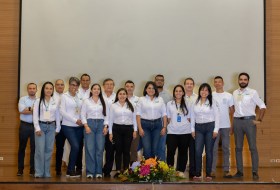News
Research Project Biotransferencia promotes a space for reflection on the excessive use of traditional plastic
The event, in its third edition, featured the participation of international and national experts who engaged in discussions with cassava producers about the importance of seeking alternatives to protect the environment.
The 3rd International Biodegradable Materials Seminar brought together students, educators, entrepreneurs, researchers, and cassava producers for two days of exploring innovations and connecting with current trends and demands in this rapidly evolving field of study. The seminar aims to reduce environmental damage caused by the excessive use of traditional plastics.
"Throughout the event, various experts who have delved into this topic acted as academic peers both nationally and internationally. Their valuable contributions focus on implementing rigorous quality controls for the process, particularly in this new stage of development. Working with biodegradable products leads us in multiple directions: minimizing environmental impacts, improving the living conditions of farmers and processors, thereby charting a new course towards more sustainable practices," stated the project director, Hugo Portela Guarìn.

Provided photo
It is a lot of knowledge gained through this project. Previously, we were cassava growers, but in a traditional manner without any technological package for the different clones that have been developed. At this moment, there are already three clones developed for biodegradables, and a technological package is implemented in them," added Agustín Terán, a cassava producer from Morales, Cauca.
The III Seminar in its third edition was organized by the University of Cauca and the Biotransferencia research project, bringing together international experts who addressed and resolved uncertainties: Rafael Auras from the University of Michigan; Luc Avérous, Head of the Polymer Research Department (CNRS) and Head of the Mutaxio Joint Research Laboratory; Kevin de Cuba, Director of the Americas Sustainable Development Foundation (ASDF) and founder of the Circular Economy Platform of the Americas; and Milena M. Ortega from the ESSENTTIA company within the Ecopetrol conglomerate.

Alongside them, Mónica Trujillo, leader of the Bioeconomy research line at the Stockholm Environment Institute (SEI) Latin America, spoke about the potential of bioplastics for Colombia's Bioeconomy.
Similarly, the researchers from the project: Rudy Alberto Gómez, Jhon Jairo Palechor Trochez, Camilo Elías Montilla, Karen Lorena Delgado Muñoz, Diana Niño Molano, Claudia Gamboa, and Carlos León, along with professors Hugo Portela Guarín and Héctor Samuel Villada Castillo, shared their experiences and reflections on the technical, business transfer, and community work carried out over the years to produce biodegradable materials made from yuca.

The academic session concluded with the Forum on Experiences in Technological Transfer Processes and Knowledge, providing a space for entrepreneurs, producers, and educators to engage in conversation and exchange ideas from broad perspectives that shape the productive chain of biodegradable materials.
As panelists, the following individuals participated:
· Javier Sánchez, representative of Almidones Uno A, a company involved in the production and commercialization of cassava starch.
· Carlos Mauricio Torres, representative of Esenttia, a Colombian company within the Ecopetrol group, specializing in the production of polypropylene, polyethylene resins, and masterbatch, with a focus on sustainability.
· Agustín Terán, representative of the Yuqueros Association of Morales Municipality, Cauca (ASYUMOR).
· Fernando Salazar, from Occiplast, a Cauca-based company specializing in injection-molded plastic forms that benefit the environment through incorporating recycling processes in their production lines.
· Alejandro Salazar, from Convercauca, a Cauca-based company dedicated to the manufacturing and commercialization of plastic bags and packaging.
This highlights that innovation and transfer processes involve the coordination of actors who view developments from various perspectives.

"Here we are to forge bonds, share discoveries, and build a networking space that actively promotes dialogue and synergy among the stakeholders shaping this ecosystem," concluded Héctor Samuel Villada Castillo.
The project "Consolidation of knowledge and technology transfer processes for the production of biodegradable materials developed in the department of Cauca," Biotransferencia, is funded by resources from the General System of Royalties (SGR) and executed by the University of Cauca.
For more information:
Research Project Biotransferencia


